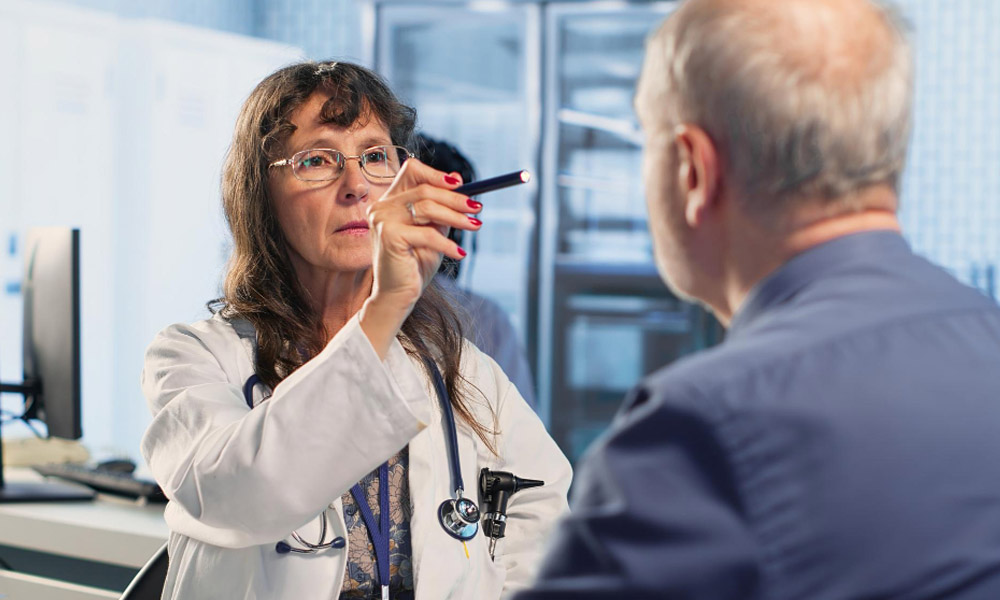Health
Are You a Candidate for Cataract Surgery London? Signs You Need to See a Specialist
Published
14 hours agoon
By
Admin
Living with declining vision can significantly impact your daily life, from struggling to read the morning newspaper to feeling unsafe whilst driving at night. If you’ve noticed changes in your eyesight, you might be wondering whether it’s time to consider professional treatment. When considering cataract surgery London offers some of the world’s most advanced treatment options, but determining whether you’re a suitable candidate requires understanding the key warning signs and assessment criteria.
Cataracts affect millions of people across the UK, with age being the primary risk factor. However, recognising the symptoms early and seeking timely intervention can make a substantial difference to your quality of life and treatment outcomes. The process of arranging cataract surgery in London typically begins with a thorough eye examination, but knowing what signs to look for can help you take that crucial first step towards clearer vision.
Understanding When You Need Cataract Surgery in London
The development of cataracts is typically gradual, which means many people adapt to their changing vision without realising the extent of their visual impairment. The most common early indicators include blurred or cloudy vision that cannot be corrected with updated glasses or contact lenses. You might notice that colours appear less vibrant, particularly blues, or that you’re experiencing increased difficulty with night vision.
Sensitivity to light and glare often becomes more pronounced as cataracts progress. Many patients report seeing halos around lights, especially when driving at night, which can create dangerous situations. Double vision in the affected eye is another significant symptom that warrants immediate professional assessment. These visual disturbances typically worsen over time, making everyday activities increasingly challenging.
The impact on daily activities serves as a crucial indicator for surgery candidacy. If you find yourself avoiding driving, struggling to read despite adequate lighting, or having difficulty recognising faces, these functional limitations suggest that your cataracts may have progressed to a point where surgical intervention could provide substantial benefits.
Determining Your Candidacy for Treatment
Healthcare professionals use specific criteria to assess whether you’re a suitable candidate for cataract surgery. The primary consideration isn’t just the presence of cataracts, but rather how significantly they’re affecting your quality of life and ability to perform routine tasks. Your eye specialist will evaluate the severity of your visual acuity loss and how it correlates with your daily needs and lifestyle requirements.
Medical factors also play a crucial role in determining candidacy. Your overall eye health, including the presence of other conditions such as glaucoma or macular degeneration, will influence both the timing and approach to surgery. Age alone isn’t a determining factor, as successful outcomes have been achieved across all age groups, with 98% of procedures completed without serious complications.
The assessment process involves detailed discussions about your symptoms, lifestyle requirements, and treatment expectations. Your surgeon will consider factors such as your occupation, hobbies, and driving needs to determine the most appropriate timing for intervention. Getting cataract surgery in London means access to cutting-edge technology and experienced surgeons who can provide personalised treatment recommendations based on your individual circumstances.
Finding the Best Cataract Surgeon London Has to Offer
London’s reputation for medical excellence extends to ophthalmology, with numerous highly qualified specialists offering cataract surgery services. The best cataract surgeon London can offer will have extensive training in the latest surgical techniques, including advanced phacoemulsification methods and premium intraocular lens options. When selecting a surgeon, consider their experience, qualifications, and patient outcomes.
Both NHS and private options are available throughout London, each offering distinct advantages. NHS treatment provides excellent care at no cost, though waiting times can vary from 6 months to 20 months depending on urgency and local capacity. Choosing private cataract surgery London provides faster access to treatment and premium lens options, with typical waiting times of two to six weeks.
The surgical procedure itself has evolved significantly, with modern techniques offering same-day discharge and rapid recovery times. Local anaesthesia ensures patient comfort during the procedure, while advanced surgical technology minimises tissue trauma and optimises healing. Finding the best cataract surgeon London has available requires research into qualifications and experience, but the city’s medical infrastructure ensures access to world-class care.
Treatment Outcomes and Success Rates
One research demonstrates exceptional success rates for cataract surgery, with 95% of patients reporting meaningful vision improvement following their procedure. These impressive statistics reflect both the refinement of surgical techniques and the expertise of London’s ophthalmic surgeons. The success rates for cataract surgery London specialists achieve are among the highest globally, providing patients with confidence in their treatment decisions.
Recovery typically begins within 24 to 48 hours, with most patients experiencing significant vision improvement during this initial period. Complete healing and vision stabilisation usually occur within four to eight weeks, though some patients may require up to ten weeks for full recovery. The artificial lenses used in modern cataract surgery are designed for lifetime use, providing permanent vision correction for the vast majority of patients.
Complications are rare, occurring in less than 1-2% of cases, and typically involve minor issues that can be effectively managed. The most serious potential complications include infection and retinal detachment, but these remain extremely uncommon when surgery is performed by experienced specialists using modern techniques. Understanding cataract surgery London cost can range from free on the NHS to several thousand pounds privately, but the long-term benefits often justify the investment in improved quality of life.
Making Your Decision
If you’re experiencing symptoms that suggest cataract development, the next step involves scheduling a thorough eye examination with a qualified specialist. Early assessment allows for proper monitoring of cataract progression and ensures timely intervention when appropriate.
The decision to proceed with surgery should be based on how your vision problems affect your daily life rather than solely on the degree of cataract development visible during examination. Many patients find that addressing their cataracts significantly improves their independence, safety, and overall quality of life, making the decision to pursue treatment highly rewarding.
Frequently Asked Questions About Cataract Surgery London
How effective is cataract surgery?
Cataract surgery boasts exceptional success rates, with 99% of patients experiencing improved or stabilised vision following their procedure. The vast majority of patients achieve significant improvements in visual acuity, colour perception, and overall quality of life. Modern surgical techniques and advanced intraocular lenses contribute to these outstanding outcomes.
What are the potential risks of cataract surgery?
While cataract surgery is considered one of the safest surgical procedures, potential risks include infection, bleeding, retinal detachment, and increased eye pressure. However, serious complications occur in fewer than 1-2% of cases. Most patients experience only minor, temporary side effects such as mild discomfort or light sensitivity during the initial recovery period.
How long does recovery take after cataract surgery?
Initial vision improvement typically occurs within 24-48 hours following surgery. Most patients can return to normal activities within a few days, though complete healing and vision stabilisation may take 4-8 weeks. During recovery, patients must use prescribed eye drops and attend follow-up appointments to monitor healing progress.
Will I need glasses after cataract surgery?
The need for glasses following surgery depends on the type of intraocular lens selected and your visual requirements. Standard monofocal lenses typically provide excellent distance vision but may require reading glasses for close work. Premium multifocal or accommodating lenses can reduce dependence on glasses for both distance and near vision, though some patients may still prefer glasses for specific tasks.
What lifestyle changes can help improve vision before surgery?
While cataracts cannot be reversed through lifestyle changes, maintaining overall eye health through proper nutrition, UV protection, and regular eye examinations can help slow progression. Ensuring adequate lighting for reading and other close work, using anti-glare coatings on glasses, and avoiding smoking can help manage symptoms whilst awaiting treatment.
How much does private cataract surgery cost in London?
The cost of private cataract surgery London varies depending on the clinic, surgeon, and lens type selected, typically ranging from £3,500 to £4,900 per eye. Premium lenses and advanced surgical techniques may increase costs, but many patients find the investment worthwhile for faster access to treatment and enhanced visual outcomes. Many private providers offer financing options to make treatment more accessible.

Aruba Adventures: Best Beaches, Snorkeling & Things to Do

Essentials Hoodie Perfect for Everyday Streetwear

Denim Tears Threads of Memory and Modern Resistance

How Kendrick Lamar’s Sister, Kayla Duckworth, Built Her Own Success

Meet Julian Henry De Niro: The Smart and Talented Son of Robert De Niro

The Benefits Of Submersible Dredge Pumps In Large Projects

E-Learning Mobile App Development Company: Transforming the Future of Education

Cameron Friscia: The Story of Kat Timpf’s Husband, From Military to Marriage

Are You a Candidate for Cataract Surgery London? Signs You Need to See a Specialist

Back to School 2025: What Teachers Really Need on Their Supply Lists

Curious About JOI Database? Read This First Before You Click Anything

Jacqueline Bernice Mitchell: The Inspiring Story of Jerry Rice’s Ex-Wife

Should You Use Wooflix in 2025? Honest Review and Best Alternatives

Where Is Noelle Watters Now? Jesse Watters’ Ex-Wife’s Life After Divorce

Who Is Marlene Knaus? The Untold Story of Niki Lauda’s First Wife

ECMISS: The Intelligent System Behind Smarter Everything

Alisande Ullman Today: What Happened After Her Divorce from Leslie Nielsen?

Where Is Tanya Hijazi Now?: All About Rick James’ Former Wife

What Happened to Frances Cain After Her Split from Jeremy Clarkson?

Where Is Anne Steves Now? The Truth About Rick Steves’ Ex-Wife

Aruba Adventures: Best Beaches, Snorkeling & Things to Do

Essentials Hoodie Perfect for Everyday Streetwear

Denim Tears Threads of Memory and Modern Resistance

How Kendrick Lamar’s Sister, Kayla Duckworth, Built Her Own Success

Meet Julian Henry De Niro: The Smart and Talented Son of Robert De Niro

The Benefits Of Submersible Dredge Pumps In Large Projects

E-Learning Mobile App Development Company: Transforming the Future of Education

Cameron Friscia: The Story of Kat Timpf’s Husband, From Military to Marriage

Are You a Candidate for Cataract Surgery London? Signs You Need to See a Specialist

Back to School 2025: What Teachers Really Need on Their Supply Lists
Categories
Trending
-

 Entertainment4 months ago
Entertainment4 months agoCurious About JOI Database? Read This First Before You Click Anything
-

 Celebrity2 months ago
Celebrity2 months agoJacqueline Bernice Mitchell: The Inspiring Story of Jerry Rice’s Ex-Wife
-

 Entertainment4 months ago
Entertainment4 months agoShould You Use Wooflix in 2025? Honest Review and Best Alternatives
-

 Celebrity2 months ago
Celebrity2 months agoWhere Is Noelle Watters Now? Jesse Watters’ Ex-Wife’s Life After Divorce
